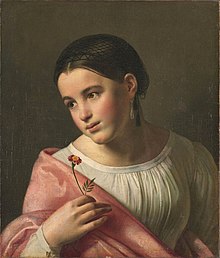Poor Lisa
Poor Lisa ( Russian Бедная Лиза , Bednaja Lisa ) is a sentimental story by the Russian writer Nikolai Karamsin , which appeared in 1792 in the Moskovsky schurnal . The first German translation hit the book market in Leipzig in 1800.
action
The first-person narrator knows the Sparrow Hills and the area around the Danilov Monastery on the outskirts of Moscow well. There is the Simonow Monastery . Around 1760, the lovely, lovable Lisa lived near it with her old mother in a hut. After the death of her father, a farmer, Lisa looked after her ailing mother and took care of the maintenance. So she occasionally sold lilies of the valley in Moscow. The wealthy young noble Erast bought a bouquet from her. The next day Lisa set out again with lilies of the valley and wanted to sell all of these flowers to the young nobleman. But Erast did not come. Lisa threw the flowers into the Moscow River . At the next meeting, Erast makes a declaration of love for the young girl. Every evening both meet near the hut on the bank of the pure, deep pond shaded by hundred-year-old oaks.
Lisa is sad when the son of a rich farmer tries to free her. She explains to Erast that as a nobleman he could never take her as a wife as a young peasant woman. Erast denies this and takes action. Lisa loses her innocence during a May thunderstorm.
Erast lies that he has to take part in the campaign of his regiment and abandons poor Lisa. Two months later when Lisa was buying medicine for her sick mother in Moscow, Erast drove by in an equipage . Lisa follows the lover. This rejects them. Because of his gambling debts, he will marry an elderly rich widow. Erast accepts Lisa with a hundred rubles.
Lisa ends her life in that deep pond under the old oak trees and is buried nearby. The mother is carried away by grief. Erast calls himself Lisa's murderer and has been unhappy all his life.
The narrator learned the story of poor Lisa from Erast a year before Erast's death.
Literary meaning
The novella is described in Kindler's literary dictionary as "perhaps the most important, but in any case best-known contribution of Russian literature to European sentimentalism". Karamsin developed his own vocabulary for feelings and sensations and brought it to the reading public. In doing so he “prepared the ground for the differentiated psychology of modern Russian novellism”.
Used edition
- Poor Lisa. P. 5–25 in Nikolaj M. Karamsin: The poor Lisa. The governor Marfa. Translated from the Russian by Julius Marty. Afterword by Helmut Grasshoff . Reclam, Leipzig 1965 (1st edition, RUB 206)
literature
- Peter Brang : Nikolaj Karamsin, Poor Lisa. In: Bodo Zelinsky (ed.): The Russian Novelle . Bagel, Düsseldorf 1982. pp. 23-33
- Horst Schmidt: From sensitivity to a new appropriation of reality. In: Wolf Düwel (Hrsg.): History of Russian literature from its beginnings to 1917 . Volume 1. Aufbau-Verlag, Berlin 1986. pp. 155–157
Web links
- The text
- Wikisource: Бедная Лиза (Карамзин) (Russian)
- online in the RVB.ru (Russian)
- online in Lib.ru (Russian)
- online in the Komarow library (Russian)
- Reference in the laboratory of fantasy (Russian)
Individual evidence
- ↑ Russian Московский журнал
- ↑ Russian Симонов монастырь
- ^ Matthias Freise: Bednaja Liza. In: Kindlers Literaturlexikon, 3rd edition 2009
